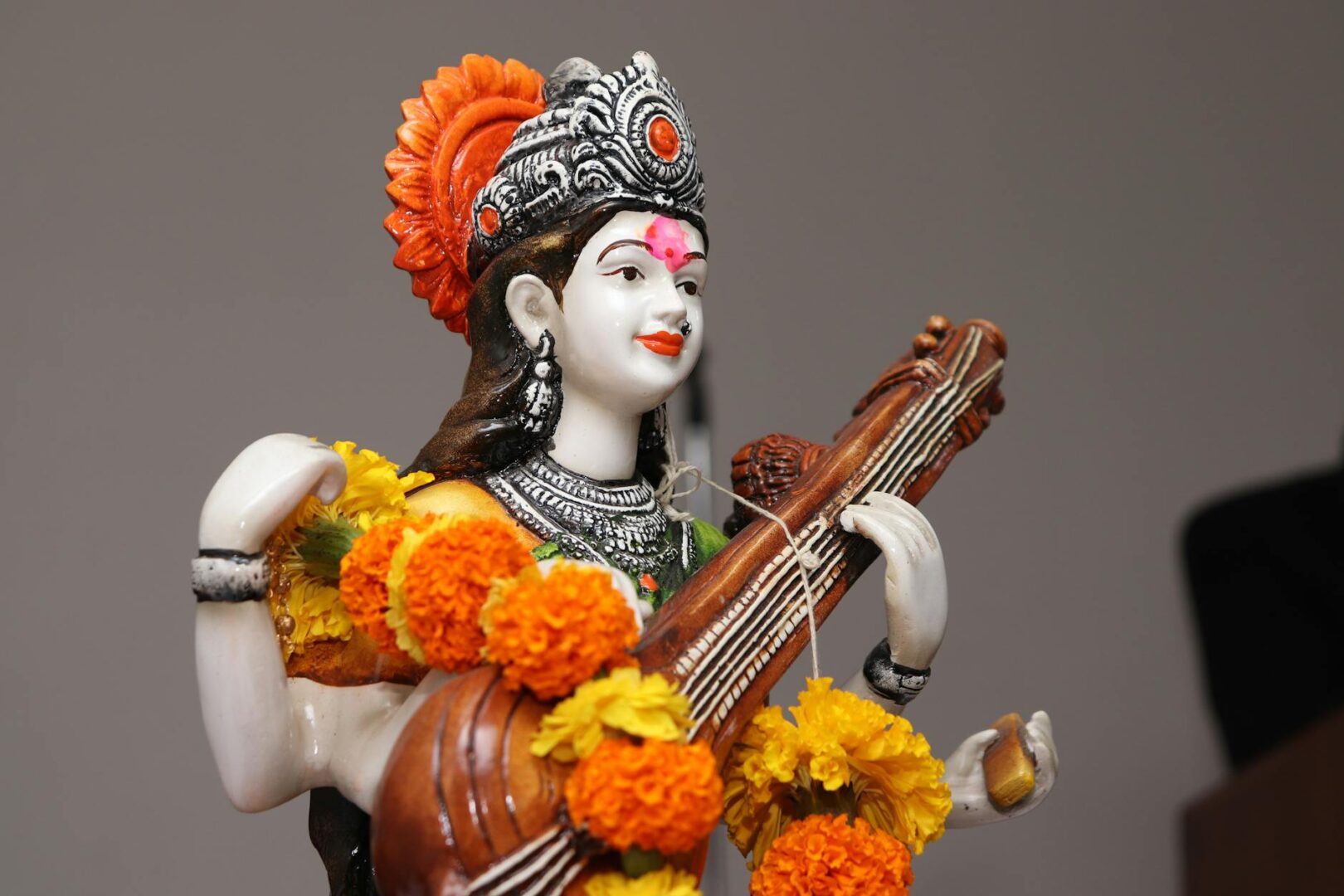
Introduction to Goddess Saraswati
Goddess Saraswati, the Hindu deity of wisdom, music, and arts, stands as a symbol of knowledge and learning across various traditions. Revered as the divine consort of Lord Brahma, the creator of the universe, she embodies enlightenment, eloquence, and purity. Often depicted with a serene expression, seated on a lotus, playing the veena, she inspires devotees to seek wisdom over ignorance.
Origins and Mythology
The origins of Goddess Saraswati are deeply rooted in ancient Hindu scriptures. Initially mentioned in the Rigveda, she was personified as a river goddess symbolizing purity and fertility. Over time, her persona evolved into the goddess of knowledge and wisdom. In various myths, she emerges from Lord Brahma’s mouth or is born from his union with Savitri, signifying her integral role in creation.
Symbolism and Iconography
Goddess Saraswati’s iconography is rich with symbolism that underscores her attributes. The white saree she adorns signifies purity, while her four arms represent the four aspects of human learning: mind, intellect, alertness, and ego. The veena she plays symbolizes harmony through music, the book she holds stands for knowledge, and the rosary denotes meditation and spirituality.
The Vedas and Goddess Saraswati
In the Vedic texts, particularly the Rigveda, Goddess Saraswati is exalted as Vak Devi, the goddess of speech. She is invoked for blessings to master eloquence and wisdom. Her presence in these ancient scriptures highlights her revered status in guiding humanity towards intellectual pursuits.
Attributes and Abilities
Goddess Saraswati possesses several attributes that distinguish her from other deities. She is known for bestowing knowledge, creativity, wisdom, and learning upon her devotees. Her ability to purify the mind and soul through education makes her an essential figure in intellectual development.
Festivals Celebrating Goddess Saraswati
Festivals dedicated to Goddess Saraswati are celebrated with great fervor across India. Vasant Panchami, also known as Saraswati Puja, marks the beginning of spring and is celebrated by students and scholars seeking her blessings for academic excellence.
Saraswati Puja
Saraswati Puja is a significant ritual conducted during Vasant Panchami. Devotees place books, musical instruments, and art tools near her idol or image to seek her blessings. The ritual involves offering flowers, fruits, sweets, and chanting mantras to invoke her divine presence.
Goddess Saraswati in Art and Culture
Goddess Saraswati’s influence extends to various art forms including paintings, sculptures, music, dance, and literature. Artists often depict her playing the veena or holding a manuscript to emphasize her role as a muse for creative endeavors.
Modern-Day Worship
In contemporary times, worshiping Goddess Saraswati has transcended traditional boundaries. Educational institutions often organize special ceremonies to honor her, emphasizing the timeless relevance of knowledge and learning in modern society.
Temples Dedicated to Goddess Saraswati
Numerous temples across India are dedicated to Goddess Saraswati. Notable ones include the Gnana Saraswati Temple in Basar, Telangana, Koothanur Maha Saraswathi Temple in Tamil Nadu, and Sharada Peeth in Kashmir which is considered one of the most important pilgrimage sites for her devotees.
Goddess Saraswati and Education
Goddess Saraswati’s association with education is profound. She is often depicted blessing students with wisdom during exams or academic challenges. Her blessings are sought by educators and learners alike to achieve intellectual growth.
Goddess Saraswati and Music
As the patroness of music, Goddess Saraswati holds a special place in the hearts of musicians. Her veena signifies mastery over melody and rhythm, making her an indispensable figure for those pursuing musical arts.
Mantras and Hymns for Goddess Saraswati
Several mantras and hymns are dedicated to invoking the blessings of Goddess Saraswati. The famous “Saraswati Vandana” is often recited by students before commencing their studies to seek her divine guidance.
Stories and Legends
Numerous stories highlight the benevolence of Goddess Saraswati. One popular legend describes how she helped sage Vyasa compose the Mahabharata by providing him with eloquence and insight.
Importance in Hinduism
In Hinduism, Goddess Saraswati holds a pivotal role as the source of all knowledge. She embodies the collective consciousness that drives humanity towards intellectual pursuits and spiritual enlightenment.
Goddess Saraswati in Other Cultures
While primarily revered in Hinduism, elements of Goddess Saraswati’s persona can be found in other cultures such as Buddhism where she is known as Benzaiten in Japan—a deity associated with everything that flows: water, words, speech, eloquence, music.
Spiritual Significance
The worship of Goddess Saraswati transcends mere academic achievement; it signifies spiritual awakening. By seeking her blessings, devotees aim to purify their minds, elevate their thoughts, and achieve a higher state of consciousness.
Frequently Asked Questions (FAQs)
Who is Goddess Saraswati?
Goddess Saraswati is the Hindu deity of knowledge, music, art, wisdom, and learning. She is one of the Tridevi goddesses alongside Lakshmi and Parvati.
What does Goddess Saraswati symbolize?
She symbolizes purity, wisdom, creativity, eloquence, and enlightenment. Her white attire represents purity; her four arms denote mind, intellect, alertness, and ego.
When is Saraswati Puja celebrated?
Saraswati Puja is celebrated during Vasant Panchami which falls on the fifth day of the bright fortnight of the lunar month of Magha (January-February).
What are some common offerings during Saraswati Puja?
Common offerings include books, musical instruments, art tools, flowers (especially white ones), fruits like bananas or mangoes, sweets like jaggery or sugarcane.
Why is the veena significant for Goddess Saraswati?
The veena represents mastery over arts like music; it symbolizes harmony through musical expressions aligning with her role as a muse for creativity.
Are there temples dedicated solely to Goddess Saraswati?
Yes! Temples like Gnana Saraswathi Temple in Basar (Telangana), Koothanur Maha Saraswathi Temple (Tamil Nadu), Sharada Peeth (Kashmir) are prominent ones where she is venerated.
Conclusion
Goddess Saraswati remains an enduring figure representing knowledge’s transformative power across generations. Her relevance continues unabated—from ancient scriptures through modern-day practices—highlighting humanity’s quest for wisdom & enlightenment under her divine guidance.


